Search
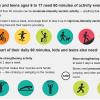
How Much Activity Do You Need?
Are you and your family getting enough exercise? Being active can help you improve your health and feel better. It can lower your blood pressure and reduce your risk of chronic diseases, like type 2 diabetes and certain cancers. Physical activity can boost your mood right away and help sharpen your focus. It can also reduce stress and help you sleep. The U.S. Department of Health and Human…
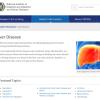
Liver Disease
Your liver is an important part of your digestive system. A liver that isn’t working properly can lead to health problems. Viruses, drugs, and alcohol can harm the liver. Learn more about these and other causes of liver disease.
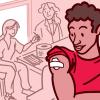
From A to Zika
West Nile virus. Lyme disease. Zika. Dengue fever. Eye-catching headlines warn us about new diseases seemingly every year. But how much of a danger do these diseases really pose? What can you do to reduce the risk from new diseases in your community? Emerging diseases are caused by microbes, usually bacteria or viruses, that haven’t infected people before or that already infect people but have…, Changing the Disease Map, The modern world has changed how animals, insects, and people encounter each other, says Dr. Desiree LaBeaud, an NIH-funded emerging disease researcher at Stanford University. “Deforestation increases the chances that humans come in contact with forest-dwelling creatures and insects,” she explains. As people move further into undeveloped areas, they become more likely to encounter animals and…, Awareness Not Panic, On the surface, the numbers look alarming. Between 2004 and 2016, nine new diseases that are spread by mosquitoes and ticks were found in the U.S. The number of people exposed to these diseases is also rising. For example, the Centers for Disease Control and Prevention (CDC) reported a record number of tickborne-disease cases nationwide in 2017: almost 60,000. But new insect-borne diseases are…, Protect Yourself, Depending on where you travel, you may come into contact with diseases that are rare in the U.S. Before you travel, talk to your doctor about getting vaccinated. It will help keep you safe and healthy. It will also help make sure that you don’t bring any serious diseases home to your family, friends, and community. NIH is funding research into vaccines for several emerging diseases. One study has…
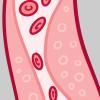
Control Your Cholesterol
Have you had your cholesterol checked? Most adults should have a cholesterol test every 4 to 6 years. That’s because nearly 78 million American adults have high levels of the type of cholesterol that’s linked to heart disease and stroke. Cholesterol is a waxy, fat-like substance that your body needs to function properly. It travels through your bloodstream to reach the cells that need it. Your…
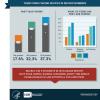
Vaping Rises Among Teens
A new survey found an alarming rise in the number of American teens who tried vaping last year. The study suggests that vaping may be driving an increase in nicotine use for teens. In vaping, a battery powered device called an e-cigarette heats a liquid into a vapor that can be inhaled. The vapor may contain nicotine (the addictive drug in tobacco), flavoring, and other chemicals. E-cigarettes…

Wellness Tips in Spanish
Good health means more than preventing and treating disease. It also means striving for well-being in all areas of your life. “Your Healthiest Self: Wellness Toolkits” provide simple ways to prevent disease and improve your relationships, emotional well-being, physical health, and surroundings. NIH has now released a Spanish version, “Su Versión Más Saludable: Herramientas de Bienestar.” Find out…

NIH Interactive Quizzes
Test your knowledge of science and human health. NIH has partnered with the, Kahoot!, gaming platform to create free, interactive quizzes for K–12 teachers and learners. Topics include superbugs, health literacy, lung health, and more.

Be a Citizen Scientist
Did you know that you can team up with scientists to help medical research? You don’t need an advanced degree or special knowledge of science. You can become a “citizen scientist” by simply devoting some of your free time to ongoing research projects. Your efforts can help to increase medical knowledge and might lead to new treatments. Your role could be as simple as playing an online game or…, All of Us, NIH’s, All of Us, Research Program invites just about anyone in the U.S. to join. The program aims to partner with at least 1 million people nationwide to build one of the most diverse health databases in history. So far, about 500,000 people have fully enrolled. Researchers are using their data to study a wide range of health issues. Diversity among participants is key for this study. Our cultural practices,…, [qtip:genetic|Having to do with genes, stretches of DNA you inherit from your parents. Genes can affect your risk for certain diseases.], make-up can have a big impact on our health. So can the places where we live and work. Researchers aim to understand how these many factors affect our health. “Some groups, like Asian Americans, Native Hawaiians, and Pacific Islanders, have been left out of these kinds of studies in the past. But we don’t want any groups of individuals to be left behind,” says Dr. Fornessa T. Randal, executive…, All of Us, . “, All of Us, is trying to include everyone.” To join, All of Us, , you complete an online consent form and surveys. You can get more involved by agreeing to share data from your electronic health records. You may be invited to a free appointment to give samples like blood or saliva. You can decide how much information you’re willing to share. One benefit of joining is you can choose to get information about your own health. You might learn more about your…, Game Time, NIH has also supported several online games and activities over the years that contribute to science. The games are free to play., All of Us, has a new game component called “Exploring the Mind.” It includes online quizzes and puzzles that measure things like your attention span and ability to recognize emotions. It’s available to most participants enrolled in the program. Another project called “ MindCrowd ” is studying how brain function changes with age. Volunteers take a 10-minute online memory test. You can take the test several…, Community Matters, Several NIH-supported citizen science projects involve working closely with communities. “One clear message we get from community members is that they don’t just want to be the subjects of research. They want to be active partners,” says NIH’s Liam O’Fallon, an expert in community-engaged science. “They want to help with defining the questions and collecting the data. And they want to help…

Sore, Scratchy Throat?
It’s a familiar sensation as the days grow shorter and colder: a scratchy, painful feeling when you swallow, talk, or even just breathe. Sometimes, a sore throat is little more than a nuisance. But it can also be a sign of serious infection. So how do you know which is which? And what can you do to soothe a sore throat? Many things can trigger a sore throat, explains Dr. Alison Han, an infectious…, [qtip:allergen|Substance that produces an allergic reaction when a person comes in contact with them, like pollen or dust.]., It can be an infection, like a virus or bacteria. Sometimes, it’s even just dry air,” she says. So, when should you call your health care provider? That depends on how bad the sore throat is and what symptoms come with it, Han explains. “If it’s a mild sore throat and a runny nose, some congestion, that’s probably a typical cold,” she says. But severe pain plus symptoms like a high fever and a…

Insights Into Long COVID
Some people end up with long-lasting illness after being infected with SARS-CoV-2, the virus that causes COVID-19. This is called Long COVID. Symptoms can include extreme tiredness, difficulty thinking or concentrating, and breathing problems. Researchers are trying to understand why some people get Long COVID and others do not. To learn more, a team of scientists compared blood samples from more…
NIH Office of Communications and Public Liaison
Health and Science Publications Branch
Building 31, Room 5B52
Bethesda, MD 20892-2094
Contact Us:
nihnewsinhealth@od.nih.gov
Phone: 301-451-8224
Share Our Materials: Reprint our articles and illustrations in your own publication. Our material is not copyrighted. Please acknowledge NIH News in Health as the source and send us a copy.
For more consumer health news and information, visit health.nih.gov.
For wellness toolkits, visit www.nih.gov/wellnesstoolkits.
